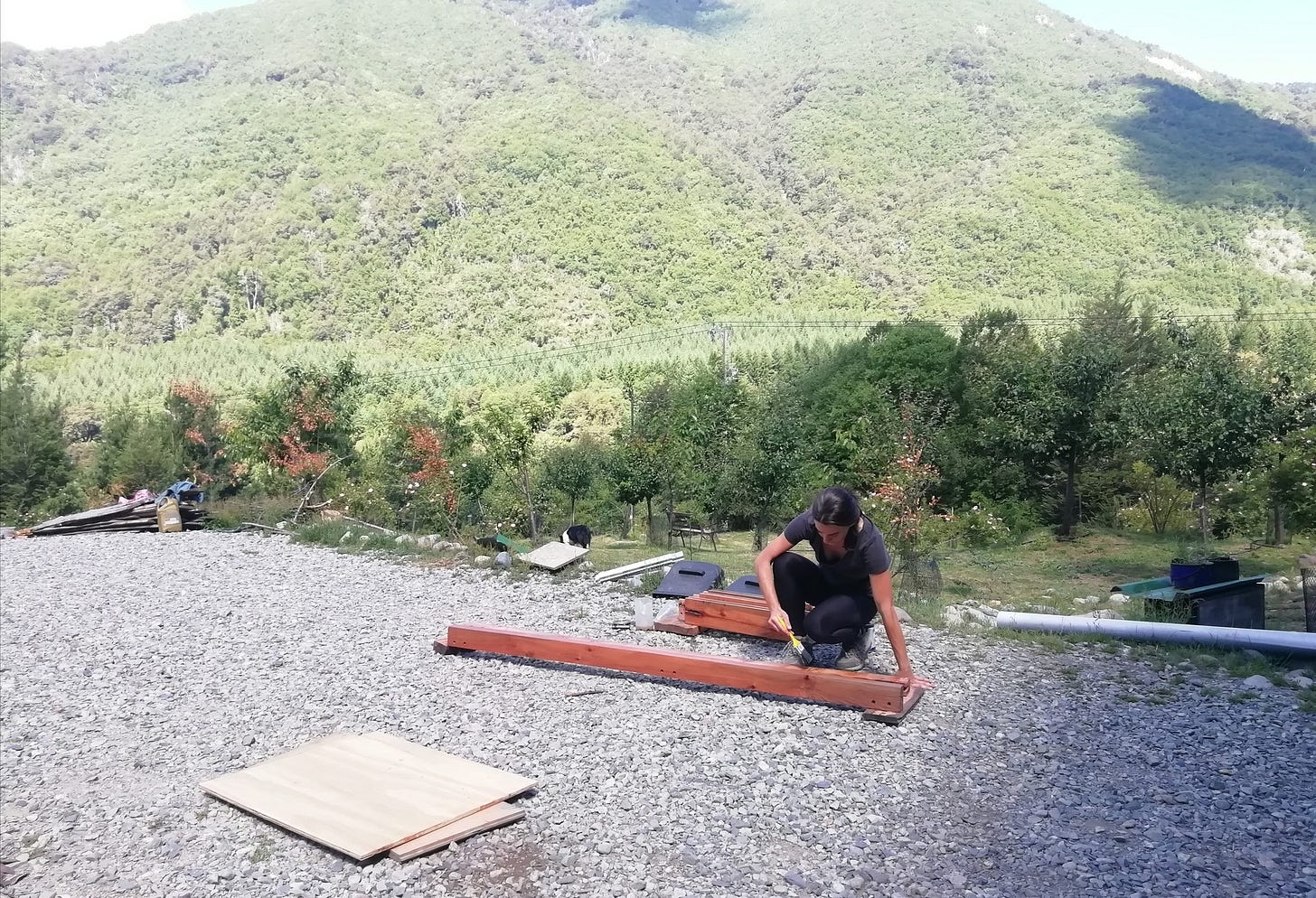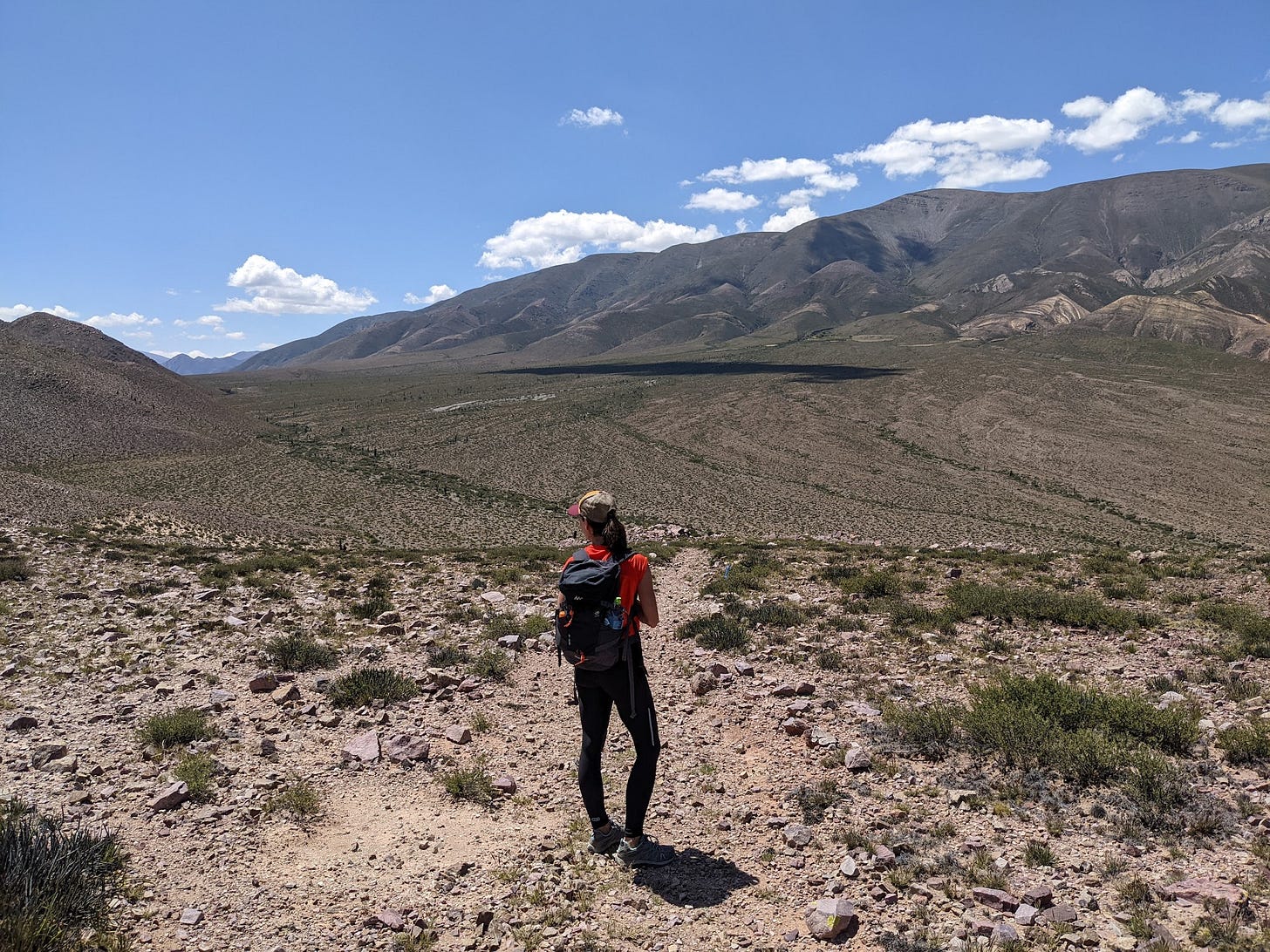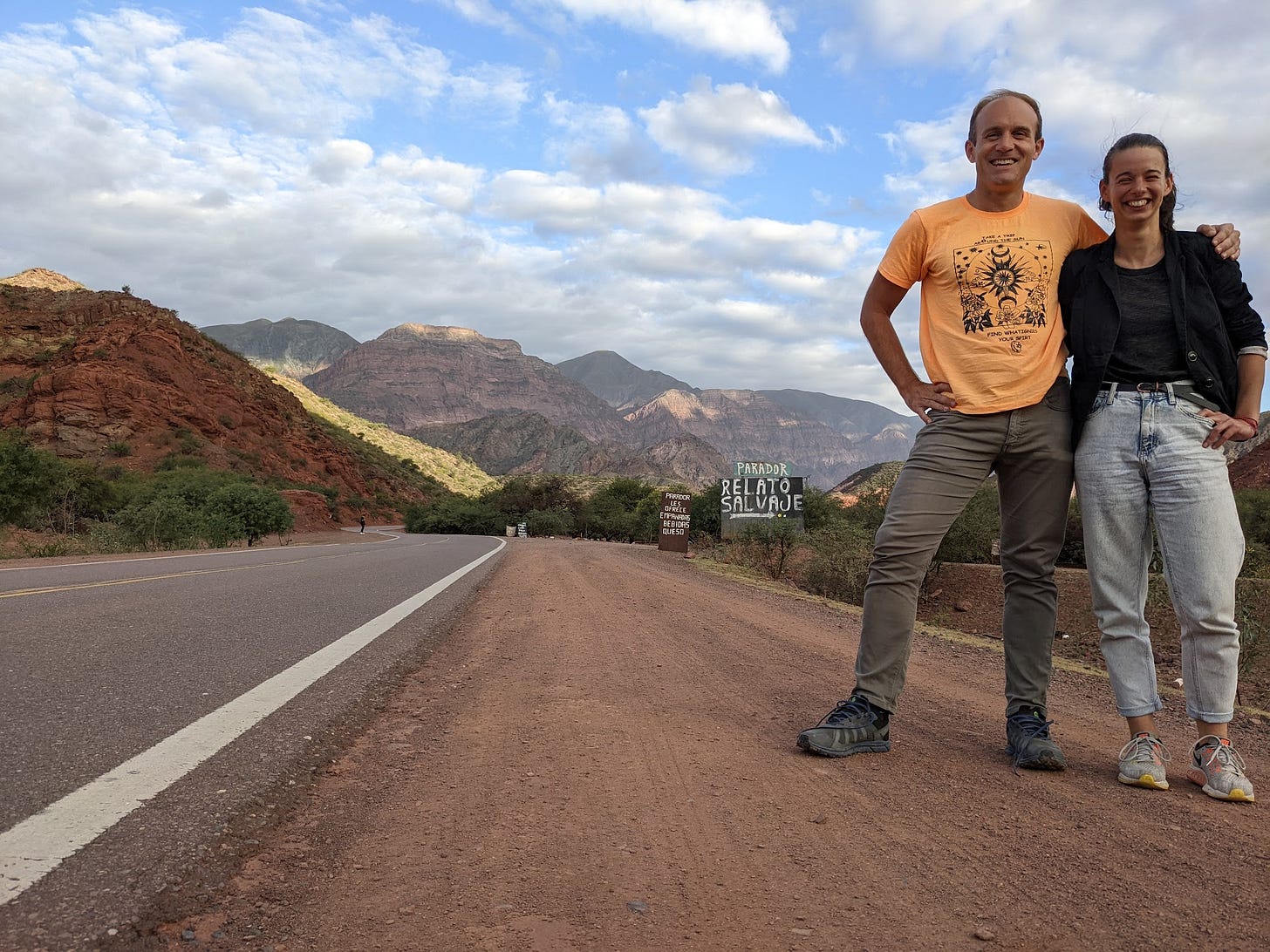Travels with Judit
from online stranger to real-life travel partner
THE PSYCHOLOGIST from Hungary caught my eye for a few reasons.
She loved the mountains. She was willing to get her hands dirty. But most importantly, she was itching to travel the world—pandemic be damned.
Anyone crazy enough to fly to South America in the middle of Covid is someone I want to meet.
It was late 2020, and I was scheming a trip to Patagonia: that mystical region in the far reaches of Chile and Argentina. Unfortunately, Chile was partially closed to travelers at the moment, and Argentina was fully closed. But as the first wave of the pandemic receded in South America, I felt naïvely optimistic that travel restrictions might ease as well.
Budget traveler that I am, I opened up Workaway—the website that connects international volunteers with hosts providing room & board—and sent messages to a hostel, language school, and small family in southern Chile, offering my services as an English tutor.
Then I clicked over to Workaway’s “Find a Travel Buddy” page… and there was Judit.
At 32 years old, Judit was a solid decade older than the typical Workaway volunteer. (I was a decade and a half older.) She described herself as open-minded, adventurous, a mountain-lover, and someone who brings “positive vibes” wherever she goes. Her profile indicated she planned to visit Chile in early 2021 (same as me) and would stay for multiple months (also my plan). No one else on the website seemed as interesting as Judit, so I reached out. ¿Por qué no?
Unfortunately, just as 2020 ended, Chile tightened its entry requirements, ruining both of our travel plans. I ended up going to Brazil instead. Judit kept working in Hungary. But Patagonia never left either of our minds, so we stayed in touch.
In October 2021, Judit finally made her move: flying one-way to southern Chile to volunteer on a Workaway farm for two months, after which she planned to travel through Peru and Bolivia. Around the same time I booked my own ticket, going down to the Argentinian side of Patagonia in late February.
We entertained the possibility of meeting up in March, but Judit wasn’t sure if she’d still be traveling then. For a while, it looked like our paths might not cross. But again, we stayed in touch.
AT THIS POINT, Judit was just an interesting stranger from the internet. I didn’t know much about her, and my adventures with Couchsurfing had taught me that travelers with intriguing online profiles might be boring, self-centered, or immature in person. So while I had a good feeling about Judit, it would have been a gamble to actually meet up with her—especially if I had to go out of my way to make it happen.
Then she started blogging.
In November, Judit began writing about her travels on a Facebook page for friends and family. She shared the link with me, I followed along, and soon enough, I was on the edge of my seat—because every post felt like something out of a travel drama or horror movie.
Judit’s problems started immediately upon her arrival in Santiago airport where Chilean immigration officers denied her access to her connecting flight, insisting that she quarantine for five days, despite the fact that she’d registered all her vaccinations and negative PCR test with the appropriate ministry. Her Workaway family scrambled to find last-minute accommodations for her in an apartment that ended up not having heating or hot water. Neighbors brought her food, she warmed water on the stove to bathe, and she took full advantage of her daily 30-minute “dog walking” allowance to escape confinement. “[I’m] alone in a cold foreign apartment without food,” Judit wrote, ”but I wanted adventure and it arrived immediately 😊”
After the quarantine she encountered another perilous labyrinth of Covid bureaucracy at the airport, which she successfully navigated with her limited Spanish, ultimately convincing an airport official to hand-write a Chilean “mobility pass” on a 2x8cm slip of paper.
Having arrived in Chile’s remote Valle de Pemehue, 70 bumpy miles from the nearest town, Judit was delighted to finally meet her Workaway hosts, with whom she’d been communicating for a full year and already enjoyed a warm, friendly relationship. But it wasn’t all roses in Pemehue, as a group of aboriginal Mapuches were burning houses and cars in a bid to reclaim their lands. Police patrolled the roads as Judit’s hosts and their neighbors anxiously organized community meetings, which she got to attend. Regardless, Judit could now do the volunteer work she signed up for: caring for the garden, brewing beer, and building a door from scratch. Through pure immersion, her Spanish skills improved from “DuoLingo gringa” to “basic competency” in just a few months.
The first time that Judit tried to visit another part of Chile, her mobility pass was denied, again, for no apparent reason. She realized that getting a third vaccination would do the trick, so she finagled her way into the Chilean healthcare system, got her booster, and was finally able to travel. She searched for pumas with a professional photographer, hung out with a famous Chilean climber she met through Instagram, and finally got to see Torres del Paine, the national park that inspired her to visit Patagonia in the first place.
Over the next few months, Judit’s would continue to travel through Chile, Peru, and Bolivia—but by January 2022, I was already convinced that she was worth meeting. We had a video call, which confirmed that she was just as positive, enthusiastic, and motivated as her posts suggested. After some back and forth we decided that, should the stars align, we would meet somewhere in northern Argentina in mid-March and travel together for a week or two.
No longer a mere internet stranger, Judit was now someone with whom I was excited to meet. She seemed to love South America as much as I did. She embraced the novelty, uncertainty, and emotion of low-budget foreign travel. And she was in the middle of a life-changing vagabonding adventure, actively figuring out her next big steps in life.
Some people are worth going out of your way to meet.
THERE ARE MANY good reasons to travel with another person: to avoid loneliness, to share costs, to overcome hardships, to celebrate victories.
There are many good reasons to not travel with another person, too: to control your itinerary, to move as fast or slow as you want, to better connect with other travelers, to read more, to write more, to reflect more.
When two people travel with conflicting motives, the friction is immediate and palpable. One feels aimless when left alone, the other feels liberated. One wants to “take it easy,” the other wants to go-go-go. One wants to save money, the other wants to spend it. One is annoyed by excessive complaining, the other is annoyed by excessive positivity.
So in those rare moments when you find someone with whom you travel really well—especially on longer trips—seize it! And then ask yourself, “Why did this work?”
For Judit and me, the answer was this: Because we’re both die-hard individualists who adore our solo time but also enjoy sharing meals and outdoor adventures with a friendly, interesting, and equally talented travel partner.
Thus it was that Judit from Hungary and Blake from California sustained a 10-day travel partnership in March 2022.
Meeting in Tilcara, a small town in northern Argentina’s Quebrada de Humahuaca (a mountain-lined desert valley), we drank a coffee, shared the stories of how we got to Tilcara (me: hitchhiking, her: crossing the perilous Bolivian border), and proceeded to make hiking plans for the next day.
My suggestion: climbing an obscure, poorly marked trail with 700m (2,300’) of vicious elevation gain from the valley floor to the ridgeline above. Her response: Sounds awesome. So far, so good.
Cheapskates that we are, we decided to stay in a 5-bed hostel dormitory that cost $13 per night. Our roommates were loud, the doors creaked, and we both slept poorly. But we laughed it off in the morning, did the hike, and felt renewed. I booked myself a private room for the following night, while Judit decided to weather the dormitory again. Around 1am she (and a few others) ended up dragging mattresses into the kitchen to avoid the snarls and snores of a man who apparently swallowed a chainsaw and should never be allowed to inhabit a dorm room again. Again, she laughed off her misfortune in the morning—and she didn’t feel abandoned by my defecting to the private room and sleeping like a baby, either.
Next up, in the city of Jujuy, we Couchsurfed with a generous and adorable 70-year-old Argentinian man, a practicing Pathologist named Luis, with whom I’d previously stayed one brief night. We both fell in love with Luis and spent 3 full days at his house, sharing meals, playing with his dogs, and walking around his quiet neighborhood. We spoke exclusively in Spanish with Luis, and every conversation left us smiling, laughing, or filled with some profound insight.
When I wanted to focus on my writing (typically after breakfast for 3-4 hours), Judit called her friends, did more travel research, and pondered whether she wanted to return to her normal life in Hungary. After lunching with Luis, sometimes we’d spend time together, and sometimes we wouldn’t. We were each comfortable taking the personal time we needed. I didn’t feel guilty about doing my own thing, nor did I resent her for doing her thing.
We decided that our next stop would be Cafayate, a mountain town famous for its wine. Our default plan was to take public buses, but when I reached out to the Ph.D. student from Jujuy with whom I hitchhiked a week ago (to see if he wanted to get coffee), he informed me that he and his girlfriend were driving to Cafayate the very next day! So Judit and I ended up “hitching” a 5-hour ride to directly to our destination, passing through another gorgeous quebrada along the way.
In Cafayate we stayed in a local family’s spare dorm room via Airbnb. We hiked another mountain, biked to a vineyard, and dove deeper in our conversations, prompting me to think harder about some of my biggest challenges. As usual, I dedicated my early mornings to writing. Judit actually pushed the “Publish” button on the Religion of Travel piece from our favorite Cafayate breakfast cafe.
Our final destination—you guessed it!—was another mountain town, Tafí del Valle, half-way between Cafayate and Tucumán, where we would go our separate ways. We hiked a giant mountain on a stunningly clear day. Through Couchsurfing, we met a wild man, a bookbinder and tango dancer named Fran, who drove us through the countryside in his ailing car (greeting horses along the way) to eat humita at a hole-in-the-wall restaurant. We exchanged adorable Whatsapp messages with Luis, who now called us hijo and hija. And we had another deep life conversation—one that actually went too deep, creating our first (and only) awkward moment of conflict. We talked things over in the morning, and everything felt tranquilo again. Good communication and good coffee solve much in this world.
In the Tucumán bus station, Judit and I drank juice, scribbled silly notes, and hugged goodbye. She would continue on to Mendoza, following her heart toward yet more mountain towns. I would fly to Buenos Aires to meet friends and soak up my favorite South American city before leaving the continent a week later.
We made no plans to meet again. Judit was uncertain about which direction life would take her; I already had the rest of my year mapped out. But we did indulge one vision. If we both returned to South America next year, perhaps we might Couchsurf with Luis once more: the traveling duo, the hijos who returned home.
The beauty and tragedy of a temporary travel partnership—much like Couchsurfing, hitchhiking, or mountain climbing—is how quickly it ends. My time with Judit was a firefly in the evening sky; to bottle it would be to kill it. We shared a dream, we saw something in each other. We met in a foreign land, we learned what we could, and we walked away with a friend, a memory, and a renewed faith.
An adventure from start to finish. ✷











